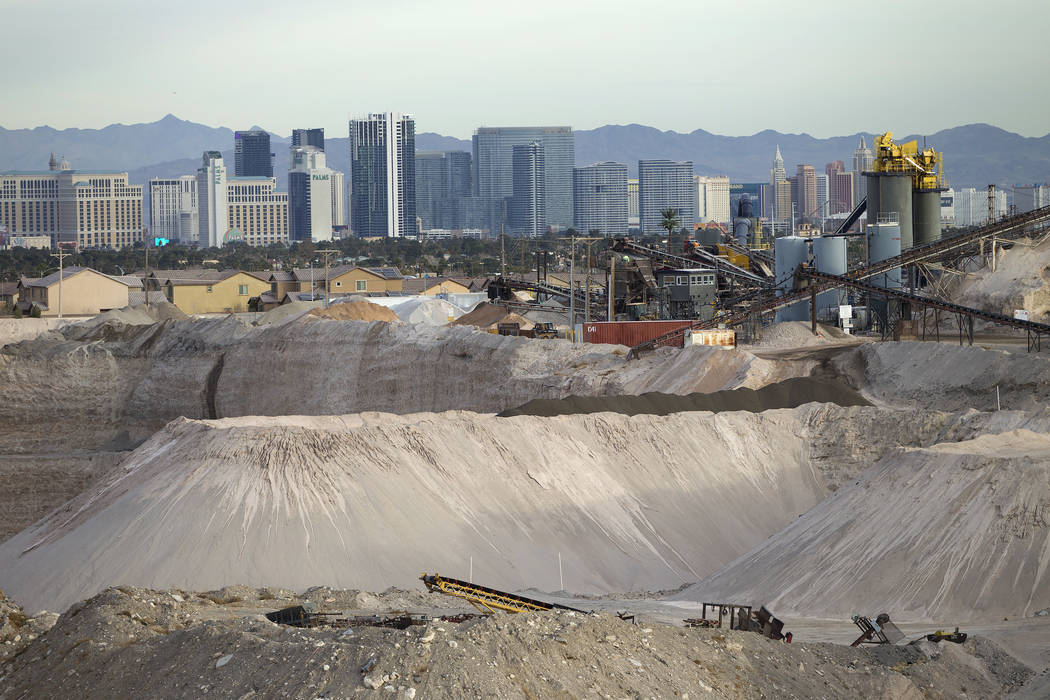CCSD unhappy with possibility of asphalt plant near school

The Clark County School District is contesting a construction company’s plans to temporarily open a second asphalt plant near Spring Valley High School.
CCSD Environmental Services Director Lori Headrick has appealed Clark County’s decision this past month to grant an air quality permit for the plant.
The appeal said pollutants “that are above industry guidelines and Federal standards” were present in the school during November and December. Headrick wrote the cause is likely the existing asphalt plant, owned by Wells Cargo and located about two blocks to the northeast on the corner of Spring Mountain Road and Tenaya Way.
At least 365 people with respiratory issues are on the high school’s campus daily, according to the appeal. Approximately 2,510 students attend the school.
“CCSD is currently working with Wells Cargo to discuss our concerns,” CCSD spokeswoman Melinda Malone told the Las Vegas Review-Journal. “We are also replacing air filters and making other improvements at Spring Valley to improve overall air quality in the school.”
Wells Cargo has filed a motion in opposition to the school district. The county has scheduled a hearing at 1:30 p.m. Feb. 8 at its Air Quality Management building on Russell Road.
“Just as with the current plant, Wells Cargo will meet all of the standards set by EPA and the Clark County Department of Air Quality to ensure environmental safety,” Trent Scarlett, the company’s vice president of construction, wrote in an email.
Pollutants could pose risks
CCSD took readings of air quality inside Spring Valley High School every 15 minutes for more than two weeks, according to the appeal. Notable maximum readings were taken of gases and coarse particulate matter small enough to be unseen by the human eye.
University of Southern California professor Ed Avol, an expert on air pollution and respiratory health, reviewed the appeal at the Review-Journal’s request.
“I think this is a little bit of a red flag,” he said. “It’s enough to say we should stop and take a look at this. I do not think this is not so bad that we need to shut down operations and vacate the school.”
Avol said the appeal doesn’t answer important questions he had, such as how often readings were above federal standards or what kinds of gases and coarse particulate matter were detected.
And while the appeal alludes to a “detailed report” about the pollutants measured, the school district did not provide it to the Review-Journal.
Still, Avol said, breathing in coarse particulate matter can trigger asthma attacks, and frequent exposure can lead to long-term health problems. For that reason, Avol said he would want a longer study to be conducted if he were a parent with a child at the school.
“The reason this is an issue is we know early life exposures lead to long-lasting health implications,” he said. “The exposures you breathe in during your first 20 years of life set you up your health trajectory.”
County discounts previous study
The school district’s study is not the first to raise concerns about pollution from the existing asphalt plant in Spring Valley.
In late 2016, UNLV assistant professor Antony Chen monitored air quality in Lantern Gardens, a neighborhood near the plant. The 20-day study found that the air quality around the plant “very likely” violates the Environmental Protection Agency’s annual standard for fine particulate matter.
Chen, whose research specializes in air pollution measurement and modeling, suggested the county study the plant’s emission in-depth for a year before allowing another plant to start operations.
But the county determined that Chen’s study didn’t meet EPA standards for air quality monitoring and could not determine the source of the particulate matter, Department of Air Quality spokesman Kevin MacDonald said.
“We shared that with (Antony Chen) himself, and he understood our position,” MacDonald said.
Chen could not be reached for comment.
Contact Michael Scott Davidson at sdavidson@reviewjournal.com or 702-477-3861.